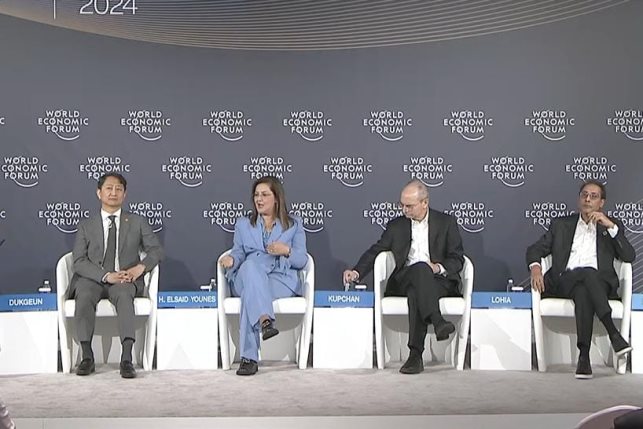Empowering locally to achieve success, and combating bias with Schneider Electric’s Charise Le
In an exclusive female-led roundtable, Le spoke to us and other media about transitioning into her CHRO role right at the start of the pandemic, empowering locally and combating bias as an international organization

Not only has the pandemic disrupted business, it has expanded the role of HR professionals. At the heart of the pandemic, HR departments steered their companies to a renewed focus on the employee while facilitating the transition to hybrid work, integrating new tech and policies to support connection and well-being during a global crisis.
“Particularly in those difficult times, the value of the company must drive the decisions that [companies] make… there is no one-size-fits-all solution,” explains Charise Le, Schneider Electric’s Chief Human Resource Officer.
Appointed CHRO in April 2020, Le’s transition into her current role was not easy, telling Business Today that COVID travel restrictions were a difficult challenge from an HR perspective.
“It was a challenge [not being able to meet people], but at the same time there were a lot of learning experiences,” she explained. Le praised Schneider’s culture, stating that “during that time, I felt very much supported by the organization, by my team, and by my colleagues.”
Operating in more than 100 countries, Schneider Electric’s global presence was an additional obstacle to overcome for Le, who is based in Asia, leading to late-night video calls to connect and strategize with international departments at the peak of the pandemic.
However, the CHRO told us that, having worked at Schneider Electric for 17 years, her thorough understanding of the organization, the business, and its people aided her, enabling her to excel at a difficult and sometimes overwhelming time.
In an exclusive female-led roundtable, Le spoke to us and other media about transitioning into her CHRO role right at the start of the pandemic, empowering locally and combating bias as an international organization.
Empowering people and values
Delivering a compelling work culture without a physical location demanded companies to reimagine how to keep teams engaged and connected. When asked about how she and Schneider Electric handled the switch to hybrid work, the CHRO explained that it was essential to remember that employee expectations always changed according to individual needs.
It’s a combination of balance, individual needs, employees and company needs, as well as the needs of your team and how you are able to be there for your team when they need you
“Empowering local is really key, and that is what we did quite well during the pandemic,” Le clarified. “Thanks to our operating model, we are one of the most ‘local’ of global companies. We work to empower local organizations and ensure we do things that are relevant to the country and its people. This, for me, is truly a key success factor.”
Schneider Electric operates using a multi-local or multi-hub strategy, in which its leadership is split among its primary markets. Le explained that their leadership is divided between Europe, Asia, and North America, allowing 80% of leadership roles to be held by local and regional talents.
On her own personal values, Le lists integrity, respect, and collaboration. “Integrity, I think is personally very important, which, at the same time, is in line with our company’s trust charter, something I am very glad about. And two, respect; you don’t have to understand everything and everyone, but you have to respect other people’s choices… this is particularly important when growing in the organization. You should not lose the capacity to respect.”
“The third is collaboration. I truly believe in teamwork,” Le emphasized. “If you look at today’s world, nothing can be done by yourself. You have to collaborate.”
When asked what skills or traits university students and the budding workforce will need for the post-pandemic workplace, the CHRO highlighted flexibility, empowerment, organization, and purpose. On the company side, Le defined empowerment as not just providing directions, but as clearly expressing expectations and providing the space and autonomy to enable accountability.
Combating bias in the workplace
“[Bias] is one of the true challenges… we still need to address this more and more in the ecosystem, in the entire process. It is not just a salary review; it is also when you hire people. Do you notice a pay gap between women and men in the hiring process, in the promotion process?” the CHRO highlighted.
There is a whole cycle that companies must pay attention to, Le clarified, acknowledging that this would be a challenge. However, it is key to removing bias, both conscious and unconscious, in the workplace, she added.
At Schneider Electric, Le states that the company has a clear strategy for combating bias, including a dedicated budget to closing the pay gap. The company has dashboards available for all of their HR departments, providing both local and international departments the ability to monitor progress, from finding pay differences to calculating the required budget to close the gap, revealed Le.
[HR teams] can use this data to make decisions, and also influence managers to place the correct budget and address the issue
How can companies help support closing the gap and combating bias? Le states it starts at the foundation, “it has to be a business strategy… it has to start from the business and the CEO setting an ambition and goal.”
While some organizations may say that combating bias and equal pay can be too KPI-driven, Le feels that ambitious KPI actually helps push progress.
“What [Schneider Electric] learned is that we need to be radical to move the needle, sometimes very radical,” Le emphasized, highlighting that the company is always on the lookout to ensure that the hiring process includes a diverse set of candidates.
However, this does not mean that women are immediately on the fast-track, but provides them with equal opportunity for the position, Le pointed out.
Personally, Le views the fact that she is a woman as an advantage, enabling her to truly “walk the talk” on diversity and inclusion at the company.
I think that being a woman in the organization has actually gotten me more attention, and allowed me to be more exposed and support [combating bias]
Schneider Electric has a clear strategy for 2025, aiming for a gender balance of 50/40/30; 50% of all hires, 40% on a managerial level, and 30% in senior management. Their most recent data in 2022 revealed that the company has achieved 40/25/27 so far.
“If you look at our diversity, it is not just gender, but also nationalities. For example, I am Chinese, working as the CHRO of a French-listed company. I am just one of many examples… we have a very diverse organization on all levels, and this requires a culture of inclusion, respecting people, and embracing different cultures… these are things we continue to work on, but overall, these are some of the reasons why people stay [at Schneider Electric].”
Schneider Electric practices on improving employee well-being
Le is proud of Schneider Electrics’ efforts in placing importance on employee well-being, which began years before the pandemic hit.
Regarding this, Le highlighted the various training materials available on Schneider Electric’s proprietary learning platform, as well as its training programs including several for leadership teams.
So, we did trainings and workshops. And this year, we did a mandatory training on mental health as well, just to provide some tips for our employees
“During COVID, I gained a lot more empathy… I needed to be very cautious with my asks,” Le revealed about her own experience working with team members that had children. “I told my team that I might have bias because I don’t have kids. I can say I understand [the pressure] but because I don’t have this particular experience, I can’t fully understand,” adding that it was a valuable lesson gained from the pandemic.
On a more positive note, Le stated that one of the good things to come out of the pandemic was a sense of connectiveness and getting to know each other better, adding that she now knows the names of all of her team’s children and pets.
Le also pointed out that, aside from awareness, it is about rituals and practicing the small things.
The CHRO states that she likes to begin meetings with a well-being check-in, using a simple “so, how do you feel today?” to gauge and understand the energy level of team members that day.
Throughout the pandemic, Schneider Electric asked leaders to do regular check-ins with remote employees, similar to Le’s approach.
Finally, the CHRO emphasized that, for team leaders, it is important to be aware of how to manage your own energy, as well as your team’s energy, adding that sometimes leaders need to be cautious in terms of what kind of pressure they are creating for their teams.





